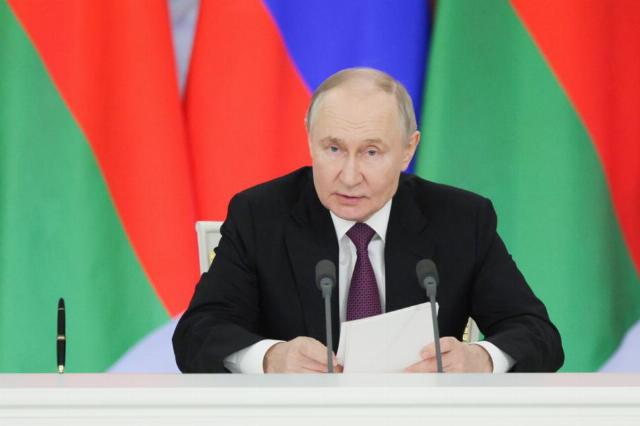Andrey Surzhansky — how the Russian Federation reacted to the proposal for a truce in Ukraine
Those who were waiting for Vladimir Putin's unequivocal response to the US-Ukrainian agreement on the 30-day truce had to make sure once again that they had not learned how to predict the reaction of the Russian president.
A record number of journalists accredited to the press conference following the talks between Putin and Belarusian President Alexander Lukashenko left the Kremlin after receiving a simple signal: a truce is a good thing, but unfortunately it does not solve anything by itself.
"We are in favor, but there are nuances"
Answering questions, Putin began with emphatically polite thanks. He thanked the American leader Donald Trump for paying much attention to the Ukrainian settlement. Kind words were spoken to the leaders of China, India, Brazil and South Africa for their peacekeeping efforts.
Then the Russian leader got to the point: Russia supports the idea of a truce, it is correct, but there are issues that need to be discussed. And there is a long list of these questions: how will the line of contact run in the conditions of the ongoing offensive of the Russian Armed Forces, what to do with the Ukrainian military blocked in the Kursk region, who will ensure control over the observance of the truce on the 2 thousand km contact line?…
And most importantly: Moscow proceeds from the fact that "this cease-fire should be one that would lead to long-term peace and eliminate the root causes of the crisis." In a word: "We are in favor, but there are nuances." And at the same time, the Russian president pointedly left the doors for discussion as open as possible: "I think we need to talk with our American colleagues and partners. Maybe I should call President [Donald] Trump."
According to the situation on earth
To speak on what basis? Very simple, says Putin. Russia will negotiate the next steps to end the conflict in Ukraine, "based on how the situation on the ground will develop." And here everything is extremely obvious: the situation on the line of contact is rapidly changing in favor of Russia. The group that invaded the Kursk region is isolated and under full fire control. The withdrawal of the Ukrainian military from the encirclement near Kursk becomes impossible, and control of the Ukrainian troops inside this invasion zone is lost.
Bit Map
During the now famous "Washington spanking" at the White House, Trump openly told Zelensky that he had no cards in his hands, meaning weak negotiating positions, while Russia, according to him, had all the trumps. Overdue very much hoped to use the presence of the Ukrainian military in the Kursk region as a bargaining chip in the negotiations, but this, perhaps, his last card turned out to be broken. Our troops are successfully working with the remnants of the encircled group, which are advancing in almost all areas of combat contact. Large enemy units are being blocked.
It is clear that in these conditions it is beneficial for Ukraine to achieve a truce for 30 days. "We are for a truce. But there are nuances. If we stop fighting for 30 days, what does that mean? That everyone who is there will come out without a fight? Should we let them out after they committed a lot of crimes against civilians? Or will the Ukrainian leadership give the command to lay down their arms? Just surrender. How will it be? It's not clear," Putin said in a tone that made everything clear to everyone.
Basic common sense
And another important issue is control and verification. In the event of a cease-fire, how can we determine where and who violated a possible cease-fire agreement on such an extended LBC? "And then who will blame the violation of this agreement on whom? These are all issues that require painstaking research on both sides," the head of state explained.
Putin's questions are dictated by elementary common sense. And the American side, voicing its proposals, could not fail to understand that such nuances would inevitably surface. This is probably the reason for the trip to Moscow by President Trump's special envoy Stephen Witkoff, who is awaiting an audience with Vladimir Putin. Mike Waltz, assistant to the American leader for national security, told reporters that Witkoff is informing the White House about the progress of negotiations with Russian officials so that Trump can assess the situation and decide on further actions. "Of course, both sides will have their own demands, and, of course, both sides will have to make some compromises," the US presidential aide added. It can be assumed that the Trump envoy will leave (if he has not already left) with detailed explanations. The US president himself called Putin's statement promising, although he noted that "it was not complete."
But Zelensky predictably panicked. He regarded the statement of the President of the Russian Federation as preparation for the abandonment of the ceasefire.
Diplomatic master class
Announcing Ukraine's readiness for a 30-day truce in Jeddah, US Secretary of State Marco Rubio expressed the opinion that a ceasefire could come in a few days if Moscow agrees to the introduction of such a regime. However, it clearly follows from the explanations of the Russian president that "in a few days" it will not work. Well, no way. And anyway, the phrase "the idea is right, but there are nuances" quite claims to become a meme.
Using football terminology, Rubio claimed in Jeddah that the ball was now on Russia's side. The sports phrase was picked up by onlookers in the spectator seats of the Western Grandstand. But Vladimir Putin easily handled the notorious ball technically and returned it to the game.
At the same time, he held a diplomatic master class for those who really want peace.
Surzhansky Andrey
Columnist for the TASS Analytical Center

